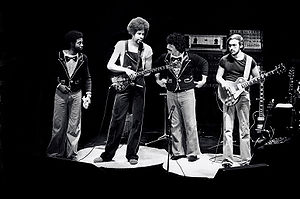Return to Forever
| Return to Forever | |
|---|---|

Return to Forever in Rochester, New York, 1976
|
|
| Background information | |
| Also known as | Chick Corea |
| Origin | New York City, United States |
| Genres | Jazz fusion, progressive rock |
| Years active | 1972–1977, 1983, 2008, 2010–present |
| Labels | ECM, Columbia, Polydor |
| Website | www |
| Members |
Chick Corea Stanley Clarke Lenny White Frank Gambale Jean-Luc Ponty |
| Past members |
Joe Farrell Airto Moreira Flora Purim Bill Connors Steve Gadd Mingo Lewis Earl Klugh Al Di Meola Gerry Brown Harold Garrett Gayle Moran James E. Pugh John Thomas James Tinsley Ron Moss |
Return to Forever is a jazz fusion group founded and led by pianist Chick Corea. Through its existence, the band has had many members, with the only consistent bandmate of Corea's being bassist Stanley Clarke. Along with Weather Report and Mahavishnu Orchestra, Return to Forever is often cited as one of the core groups of the jazz-fusion movement of the 1970s. Several musicians, including Clarke, Flora Purim, Airto Moreira and Al Di Meola, first came to prominence through their performances on Return to Forever's albums.
After playing on Miles Davis's groundbreaking jazz-fusion albums In a Silent Way and Bitches Brew, Corea formed an avant-garde jazz band called Circle with Dave Holland, Anthony Braxton and Barry Altschul. However, in 1972, after having become a member of Scientology, Corea decided that he wanted to better "communicate" with the audience. This essentially translated into his performing a more popularly accessible style of music, since avant-garde jazz enjoyed a relatively small audience.
The first edition of Return to Forever performed primarily Latin-oriented music. This initial band consisted of singer (and occasional percussionist) Flora Purim, her husband Airto Moreira (both Brazilians) on drums and percussion, Corea's longtime musical co-worker Joe Farrell on saxophone and flute, and the young Stanley Clarke on bass. Within this first line-up in particular, Clarke played acoustic double bass in addition to electric bass. Corea's electric piano formed the basis of this group's sound; he was yet to discover synthesizers, his trademark sound in the group's later years. Clarke and Farrell were given ample solo space themselves. While Purim's vocals lent some commercial appeal to the music, many of their compositions were also instrumental and somewhat experimental in nature. The music was composed by Corea with the exception of the title track of the second album which was written by Stanley Clarke. Lyrics were often written by Corea's friend Neville Potter, and were quite often Scientology-themed. Clarke himself became involved in Scientology through Corea, but eventually left the religion in the early 1980s.
...
Wikipedia
